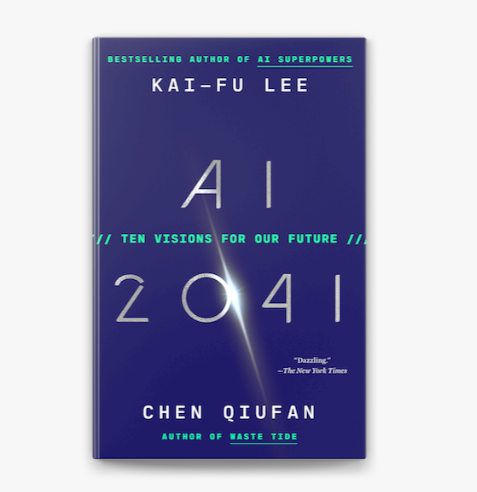I picked up AI 2041 by Kai-Fu Lee & Chen Qiufan with high hopes. The idea of blending science fiction with deep analysis on artificial intelligence intrigued me—especially coming from Kai-Fu Lee, someone whose views on AI I’ve long respected.
The book is structured as ten short stories, each imagining a future scenario shaped by a specific AI technology, followed by a commentary unpacking the real-world trends and risks. While I appreciated the intent, the execution left me underwhelmed.
Out of the ten stories, only the first and the last truly resonated with me. The first story set the stage with a thoughtful and emotionally grounded narrative. The last one closed the book on a strong note, capturing a more philosophical tone that stayed with me after turning the final page.
The stories in between, however, felt a bit too constructed—like vehicles for concepts rather than compelling fiction. Many lacked the emotional depth or narrative tension needed to make the futuristic visions feel personal or urgent. At times, they read more like extended case studies with characters inserted as afterthoughts.
That said, the accompanying analysis by Kai-Fu Lee was the real value of the book. His breakdowns of where AI is headed—autonomous finance, personalized education, healthcare diagnostics—are insightful, if not already familiar to those who’ve been following AI trends. He brings nuance and clarity to complex subjects, especially when addressing ethical concerns, geopolitical dynamics, and job displacement.
If you’re new to AI and enjoy speculative fiction, this might be a good entry point. But if you’re looking for emotionally rich storytelling or groundbreaking AI predictions, you may walk away feeling like I did—interested, but not entirely moved.
This book is a conversation starter, not a roadmap. And for that, I’m still glad I read it.


https://vitz.ru/forums/index.php?autocom=gallery&req=si&img=4804
Thank you. I appreciate the comment.
-Bidrohi
Very good https://is.gd/tpjNyL
Thank you. I appreciate the comment.
-Bidrohi
Very good https://is.gd/tpjNyL
Thank you. I appreciate the comment.
-Bidrohi
Good https://shorturl.at/2breu
Thank you. I appreciate the comment.
-Bidrohi
Awesome https://shorturl.at/2breu
Thank you. I appreciate the comment.
-Bidrohi
Good https://shorturl.at/2breu
Thank you. I appreciate the comment.
-Bidrohi
Very good https://lc.cx/xjXBQT
Thank you. I appreciate the comment.
-Bidrohi
Awesome https://lc.cx/xjXBQT
Thank you. I appreciate the comment.
-Bidrohi
Awesome https://short-url.org/10VGf
Thank you. I appreciate the comment.
-Bidrohi
Awesome https://t.ly/tndaA
Thank you. I appreciate the comment.
-Bidrohi
Good https://t.ly/tndaA
Thank you. I appreciate the comment.
-Bidrohi
Good https://t.ly/tndaA
Thank you. I appreciate the comment.
-Bidrohi
Good https://t.ly/tndaA
Thank you. I appreciate the comment.
-Bidrohi
Awesome https://t.ly/tndaA
Thank you. I appreciate the comment.
-Bidrohi
Very good https://urlr.me/zH3wE5
Thank you. I appreciate the comment.
-Bidrohi
Awesome https://urlr.me/zH3wE5
Thank you. I appreciate the comment.
-Bidrohi
Awesome https://rb.gy/4gq2o4
Thank you. I appreciate the comment.
-Bidrohi
Very good https://rb.gy/4gq2o4
Thank you. I appreciate the comment.
-Bidrohi
Good https://rb.gy/4gq2o4
Thank you. I appreciate the comment.
-Bidrohi
Very good https://rb.gy/4gq2o4
Thank you. I appreciate the comment.
-Bidrohi
Very good https://is.gd/N1ikS2
Thank you. I appreciate the comment.
-Bidrohi
Good https://is.gd/N1ikS2
Thank you. I appreciate the comment.
-Bidrohi
Very good https://is.gd/N1ikS2
Thank you. I appreciate the comment.
-Bidrohi